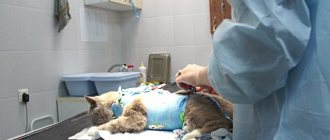What is cat castration
Castration of cats is a procedure to stop an animal's sexual activity. By ceasing to produce reproductive hormones, the body loses its reproductive function. This allows owners to resolve the issue of their pet’s sexual behavior. There are various methods of castration:
- medicinal,
- chemical,
- surgical.
Medical castration involves the use of hormonal drugs. Chemical castration involves radiation exposure of the cat's testes. These methods do not always provide a complete guarantee and are unsafe for the health of the animal.
The most popular among owners and veterinary specialists is surgical castration of cats, which modern veterinary medicine classifies as an ordinary operation. This is a 100% guarantee of removal of the gonads.
Animal owners should have an idea of how cat castration occurs in order to responsibly approach the issue of preparing the animal for surgery, postoperative care, and understand the existing risks of surgical manipulation. It is also important to know the optimal age of your pet for a safe and effective procedure.
We recommend reading about how to prepare a cat for castration. From the article you will learn what needs to be done before castrating a cat, deworming and vaccinations before surgery, feeding rules.
And here is more information about what to do if a cat marks after castration.
Benefits of castration
Castration of pets has many supporters, and this is no coincidence. The operation has significant advantages:
- The pet's behavior becomes measured and calm. The reproductive instinct ceases to operate, as a result of which the animal does not leave urine marks on its territory, does not scratch furniture and does not attempt to escape from the house. Uncontrolled aggression disappears, the cat does not meow at night.
- The cat's health is stabilized both at the physiological and psychological levels.
- The number of stray animals is decreasing. The owner does not need to worry that the offspring of his pet will inhabit the street.
- It has been scientifically proven that neutered cats live longer than their unneutered counterparts. Diseases of the genitourinary system appear much less frequently in castrated cats than in non-castrated cats, and their course slows down.
How to understand that it’s time to neuter your cat
The owner can understand that it is time to castrate a cat based on the following criteria:
Pet's age. Veterinary experts consider 5-7 months to be the best time for the operation. By this time, the animal’s body has formed and prepared for the reproductive period.- Behavior correction. If the cat begins to mark the room and objects, disappears on the street for a long time, and returns with wounds and injuries, then the best solution is to remove the gonads.
- Experienced breeders recommend castrating any animal that is not of breeding value before puberty in order to control the cat population.
Description of the procedure and indications for it
Often a cat's sexual activity causes many problems for owners. For example, an animal during the mating season becomes aggressive and emits wild screams. To prevent the pet from causing such trouble, the owner decides to castrate it. But this operation has both advantages and disadvantages.
Pros of castration:
- the reproductive instinct is suppressed;
- after the operation, the pet stops marking its territory;
- the animal becomes calmer and does not take part in street fights with other cats.
During castration, a cat's testicles are removed or the spermatic ducts are ligated. Owners most often agree to the first option, because... after dressing, sexual attraction to the female remains. The animal continues to yell and show aggression.
Surgery to remove a cat’s testicles is vitally indicated in the following cases:
- diseases of the genitourinary system;
- testicular injuries;
- prostate cancer, tumors in the genital organs;
- genetic diseases.
The owner should know how a cat is castrated and what happens after the operation. First, the doctor administers anesthesia and shaves the hair from the scrotum. Then, using a scalpel, he makes 2 small incisions, tightens the seminal canal and removes the testes. Most often, stitches are not applied. Castration lasts about 5 minutes.
At what age can a barn cat be neutered?
As a rule, in the absence of health contraindications, castration of a cat can be performed before the age of 7 years. If the pet arrived in a new home as an adult, then the operation can be performed after preliminary consultation with a veterinary specialist.
In old age, surgery can lead to complications and even death of the animal. In order to reduce the risk of negative consequences, before surgery on a barn cat, it is necessary to conduct a full clinical examination with a mandatory cardiogram and tests for sexually transmitted infections.
Dangers of castration at an early age
Of course, not everything is so perfect. Early castration also has its disadvantages, some of which are quite serious.
So, let's list the main negative features :
- Operating on a small kitten is still a “pleasure”. It is much easier to perform an operation on a cat whose genitals have fully developed and are of “sane” size. And further. It is believed that kittens tolerate local anesthesia and anesthesia much more easily... but this is not entirely true. Their liver and kidneys are very sensitive and can suffer significant damage if the anesthesiologist makes the slightest mistake. In the future, the animal will definitely develop kidney and/or liver failure. But animals with such pathologies do not live long, and your pet will probably not live to old age.
- A significant danger when sterilizing any kitten is hypothermia (hypothermia). The thermoregulation system of young animals is very imperfect, which makes the likelihood of hypothermia very high. In addition, kittens have a very thin layer of subcutaneous fatty tissue and they hardly know how to tremble (but tremors are the body’s natural way of warming up). Moreover, the liver of young animals synthesizes and accumulates glycogen very poorly, and therefore even fasting, which is mandatory before any operation, can cause significant harm to the pet’s health.
- Note that too early loss of the source of sex hormones (that is, the testicles) can be fraught with pathologies in the development of muscles and bone tissue. But! Now many veterinarians categorically disagree with this postulate. French experts recently conducted an experiment by castrating a group of experimental animals aged from seven weeks to seven months. The results are that there is not much difference between all these cats.
- The phenomenon of “juvenile behavior” is known. Early neutered cats sometimes behave like kittens into old age. Again, it’s hard to call this a disadvantage.
- Another problem is more objective - it is not recommended to sterilize purebred kittens early, since later they may display some rare qualities that are useful for the breed as a whole. Simply put, an early sterilized cat can be of great value in terms of breeding work, but when these qualities appear (and this will not happen before the age of one), it will be too late to change anything. Thus, kittens that come from healthy, purebred parents without defects should not be neutered at an excessively early age.
Regarding the last point, we need to make a small digression. It is precisely because of the reluctance to early sterilization of potentially valuable animals that professional breeders sell such kittens with a “deferred sentence.”
Buyers often sign an agreement stating that they undertake to sterilize their pet no later than, but not earlier than, a certain date, but only after the seller has examined the animal. And the point here is not the “strangeness” of the selling party or greed. Moreover, if the pet does not have any valuable characteristics, the buyer may be returned (if it is included in the contract) a certain part of the amount spent on the purchase.
Let us describe a couple more negative aspects that owners of young castrati may encounter:
- Such animals have a markedly increased risk of balanoposthitis. This pathology is fraught with permanent infections of the genitourinary organs and requires additional surgical intervention.
- Presumably, “early castrati” have fewer problems with obesity and the risk of developing urolithiasis, but this issue should be considered quite controversial. There have been cases when very young kittens quickly turned into “balls”.
Below we will describe some features of sterilization of young animals, starting from the age of three months. This will help you understand at what period it is better to castrate a cat.
When not to castrate a cat
There are a number of situations when you cannot castrate a cat:
Diseases of the myocardium, kidneys, liver. Anesthesia has a negative effect on the animal’s body and can lead to serious complications, including death.- Blood clotting disorder. Even a simple operation to remove the gonads is accompanied by blood loss and, in case of blood diseases, can end badly for the cat.
- Elderly age. Veterinary experts do not recommend performing surgery on animals older than 6-7 years.
- Presence of sexually transmitted infections. Castration can be carried out only after the animal is completely cured in order to avoid the spread of infection to the organs of the genitourinary system.
- Untreated inflammation, purulent wounds.
- In the case of urolithiasis in a cat, the decision about surgery is made by a veterinarian based on the results of the examination.
According to experienced breeders, a cat should not be castrated before 4 months of age. It is believed that by this time the body has not formed, and early surgery will harm this process. In addition, castration before 4 months is often complicated by pathology such as narrowing of the urethra.
Wrong stereotypes
Wrong stereotypes always surround people and, unfortunately, many of them succumb to them. One of these stereotypes is that after castration an animal becomes lethargic, passive and quickly gains weight. However, it is not! The cat's mobility is preserved, he is just as inquisitive, active and playful. The only thing that can affect this is character, breed, illness and age.
Your pet's weight can also be maintained by purchasing the right food and setting the right diet.
Sexual desires awaken in a cat only after growing up, when the hormone begins to act. Until this moment, the pet absolutely does not care about the opposite sex. Therefore, the second unjustified stereotype is the fear of breaking the cat psychologically, thinking that you have deprived him of the opportunity to walk with a cat at least once in his life. In fact, cats are not people, they are not taught by their parents or at school, so how can they know what will happen to them later! So, before natural instinct comes into play, you can act, and the sooner the better.
Even if the cat has already lived a full life, then having operated on him at any age, his desire will disappear forever.
The only way to harm the animal is to take it on a date before the procedure. Still, something will be deposited in the pet’s memory, and then some small feelings and desires may awaken. Therefore, it is best to operate on the cat before he has time to take a walk.
What to do before castrating a cat
Before castrating a cat, you need to do the following:
- Conduct a comprehensive examination. At a veterinary clinic, a specialist will first order an electrocardiogram, check the functioning of internal organs, and rule out sexually transmitted infections.
- Prepare a veterinary passport for the animal, which indicates the treatments and vaccinations performed. Vaccinations must be done no earlier than 30 days before the intended operation.
- To transport an animal, you need to stock up on a carrier and a warm blanket. You will need tissues in case of vomiting.
- Before surgery, the cat should be kept on a fasting diet for 8 hours. 4 hours before the procedure, limit access to water.
Watch this video on how to prepare a cat for castration:
Preparing a cat for castration
The operation requires careful preparation of the animal:
- Examination by a veterinarian and passing the necessary tests. This is a prerequisite for successful surgery and rehabilitation without consequences. It is better to castrate cats that are completely healthy.
- You should not feed your pet heavily for 12–15 hours immediately before surgery. You can castrate a cat that has eaten some wet pate or porridge a few hours before surgery. At the same time, access to drinking water must be open at all times.
- It is recommended that surgery be performed on a pet that has already received the appropriate vaccinations. This will significantly reduce the risk of postoperative complications.
- Before castration, do not disturb your pet, try to provide him with a calm home environment.
- If possible, bring the animal to the clinic directly at the appointed time, since a long wait in an unfamiliar place has a detrimental effect on the psyche and general condition of the animal.
© shutterstock
Method of operation
An animal owner who decides to operate on his pet should know how cats are castrated. Surgical removal of the testes is a simple operation performed under general anesthesia or local anesthesia.
After preparing the surgical field, the surgeon makes incisions, tightens the seminal canals (applies ligatures or uses a biological knot) and removes both testicles. Sutures are usually not required after surgery. Surgical wounds are sprinkled with antiseptic. Modern techniques make it possible to remove the testes through one microincision. You can learn directly from the specialists on site about how cats are castrated in a particular clinic.
Scheme of applying a castration loop to the spermatic cord (according to Sadovsky)
Owners of animals who decide to undergo surgery often wonder: how long does it take to castrate a cat? The actual procedure takes about 10 minutes. Putting the cat into narcotic sleep and preparing the surgical field (shaving the hair in the groin area, treating with an antiseptic) will require a little more time.
The risk of this surgical procedure is minimal. Fewer complications are observed when castrating young animals under the age of 1 year. Adults may experience problems associated with the effects of anesthesia. Postoperative complications can be minimized by following recommendations for preparing the animal for castration and postoperative care for the cat.
We agree with the veterinarian
There may be several indications for castration of a 5-year-old cat. It is very important to carry out such an operation if your pet roams freely on the street, so that unwanted offspring are not born. Unfortunately, this only occurs to certain, especially conscientious owners. What other indications could there be?
- Serious genetic diseases. The cat should not pass them on by inheritance.
- Cryptorchidism.
- Excessive aggression or activity.
- Injuries to the reproductive organs.
- The pet marks its territory, as we have already discussed.
That is, there may be a recommendation from a veterinarian, on the basis of which the owner will decide on castration. Or, on the contrary, the request comes from the owner of the animal, and the doctor is already determining whether it is worth castrating a 5-year-old cat. In fact, this operation can be performed at a later age. But first you need to make sure that the animal is healthy. That is, you will need to take blood and urine tests and do an ultrasound. This will serve as the basis for admission to the procedure or medical withdrawal, full or temporary. Sometimes castration is prescribed for cats over 7 years old for medical reasons. The cause may be tumors, prostatitis, hormonal disorders.
Where is the best place to castrate a cat?
As to where it is better to castrate a cat - at home or in a specialized clinic, veterinarians do not give a definite answer, it all depends on the age. If the animal is young and healthy, then you can perform a simple operation in your own home, trusting a qualified specialist. If the cat is elderly or has any problems, it is better to have the procedure performed at a veterinary clinic to avoid complications.
Features of castration at six and nine months
At this time, the cat can rightfully be considered an adult. Therefore, there are no special requirements for castration:
- General anesthesia is permitted. But it is still better that by the time of the operation the pet is already nine months old. In addition, a general blood test is required.
- Important! Starting at this age, you can castrate a British cat. Again, it's best to wait until your pet is close to nine months old. The reason is that the body of these animals develops more slowly than if compared with cats of other breeds.
What happens after castration of a cat?
After castration of a cat, the animal must recover from anesthesia. As a rule, the veterinarian will release the owner with the pet when he is sure that everything is okay with him. When transporting home, it is necessary to place a waterproof oilcloth in the carrier, since the animal may involuntarily urinate under the influence of narcotic substances. Vomiting is also possible. A warm blanket will help keep a cat under the influence of anesthesia warm.
After the animal comes to its senses, it must be controlled for some time - do not allow it to climb to heights, jump, or move actively. You can feed the operated animal no earlier than 12 hours after the operation. Water should be offered immediately upon arrival home.
Watch this video about what consequences can occur after castration of a cat:
To castrate a Thai cat or not?
The owners make this decision, depending on their needs, desires and conditions in which the cat lives. Castration does not carry any risks for the body of a Thai or Siamese cat, so there is no need to be afraid of this operation. If you want to become a breeder, think carefully about whether this is what you need. The competition in this business is high, the costs are high, and the profits may not be as high as you expect. Breeding cats is more of a hobby, an activity for the soul, than for income.
Therefore, for most owners who keep cats in urban environments, castration of their pets will be the best option.
The effect of castration on an animal
The sexual behavior of domestic cats causes owners a lot of trouble. The animal behaves restlessly, tries to escape outside, marks the room, and makes loud noises. Having decided to castrate their pet, owners often ask questions about how castration affects the cat, whether the pet will be apathetic and lethargic.
Removal of the gonads leads to the cessation of hormone production and the extinction of sexual functions in the animal.
This is reflected in the behavior of a neutered cat. He becomes balanced, calm, non-aggressive, indifferent to the opposite sex.
Animals are easier to manage and raise. Without being tormented by sexual instincts, a neutered pet has more active contact with humans and becomes affectionate and obedient. The cat does not mark the territory, leaving strong smelling odors, and does not try to leave the room in search of the cat.
As a rule, if the pet was playful before castration, then after the operation it will be happy to participate in outdoor games. The animal's hunting habits also do not suffer from castration.
Neutered cats that successfully caught mice before the operation will also be active hunters after the procedure. In addition, calm sexual behavior will allow you to more actively follow hunting instincts.
Owners of neutered pets should know that after surgery, their pets need fewer calories. The diet of a neutered cat must correspond to its physiological needs. Following the correct feeding regimen and caloric intake will help avoid the problem of obesity.
Pros of castration
The older the animal, the more balanced you need to approach this issue. Is it possible to castrate a cat at 5 years old? If your veterinarian sees no contraindications for this procedure, then it is possible. The need is usually caused by the living conditions of our pets. They do not live in the wild and are deprived of the opportunity to communicate normally with representatives of their kind, that is, to fight with other cats and mate with females. But no one told the instincts about this. Therefore, a young cat will still throw out excess energy, jumping on curtains and cabinets for hours, but with age he will increasingly clearly indicate his desires.
A mature, unneutered cat's behavior will change. He becomes more restless, irritable, and aggressive. And that's not even taking into account the scent marks. It is not for nothing that many owners have a question about whether it is possible to castrate a cat at 5 years old. It's good if the animal has been with you since it was young, then you've had time to think about it. What if the cat is already an adult? Then you need to make a decision as quickly as possible. So, what are the advantages of the operation:
- Most often, the animal stops marking its territory.
- Aggression and night screams disappear.
- The risk of developing urolithiasis is reduced.
- Neutered people usually live longer.
When is the best time to castrate a cat?
An effective change in the sexual behavior of an animal after castration directly depends on the age at which the cat is castrated. The timing of castration depends on the individual characteristics of the animal, the speed of its puberty, and its physical condition at the time of the operation.
To the specific question of how many months cats are castrated, veterinarians do not have a clear answer. Experts believe that the best period for surgery is between 7 and 9 months of age. It is at this moment that the animal experiences full puberty, and the stereotypes of sexual behavior in the cat have not yet been fixed. In large breeds, puberty is delayed by 2 to 3 months.
At an earlier age, castration is not recommended due to the risk of developing urethral stricture. This is due to underdevelopment of the urethra and the inflammatory process that accompanies any surgical intervention.
By one year, puberty is completely completed, and sex hormones are produced not only by the testes, but also by the pituitary gland, located in the animal’s brain. Therefore, castration at a later age does not always provide the desired effectiveness in terms of correcting a cat’s sexual behavior.
If for some reason the adult animal was not neutered, the operation can be performed at an older age, up to 7 years. However, in this case, there is a possibility that the operation will not lead to the desired result. When performing an intervention after 7 years of age, the risk of complications increases sharply, which is associated with the use of anesthesia and postoperative complications in old animals.
Watch this video about at what age to castrate a cat:
When is it too late to castrate a cat?
There are situations when it is too late to castrate a cat for the purpose of behavior correction - with active sexual behavior and when the operation was performed in adulthood. If an adult cat has been actively marking territory and objects for many years, then the operation to remove the gonads may in this case be unsuccessful. The fact is that over the years, under the influence of hormones, an animal develops a certain style of sexual behavior.
In a cat that has actively used its reproductive potential, sex hormones are synthesized not only by the testes, but also by the pituitary gland. Therefore, in some individuals, castration does not eliminate unwanted behavior in the form of leaving marks, and from this point of view, it is too late to perform the operation.
Is it possible to castrate a cat when he is walking in the spring?
Veterinary experts believe that a cat can be castrated in the spring, since males do not have a clear period of sexual heat. The time of the operation may not be tied to the season of the year.
Some breeders believe that it is undesirable to castrate a cat while he is walking. This may lead to the fact that after removal of the gonads the animal will continue to mark its territory and other negative behavior may remain.
Pros and cons of castration
Castration, like any operation, has its pros and cons, which are determined by the influence of testosterone on the behavior of the animal.
Pros of castration
The benefits of castration are obvious and at the same time serious enough to decide on the operation:
- The cat stops marking his territory. His urine loses its strong unpleasant odor. All this is due to hormonal changes that occur after castration. Since the smell of urine and the cat’s desire to mark territory are regulated by testosterone, which is produced by the testes.
- Unneutered cats are usually much more aggressive. This is due to the fact that the male must drive away any other competitors, and during the period of sexual heat he must not be afraid of anything. This behavior is regulated by testicular hormones. Of course, after castration the animal becomes calmer.
- In fact, the pet suffers greatly due to the absence of a cat, since its hormonal background gives it a strong desire, which is not feasible. An unfulfilled need causes depressive disorder.
Disadvantages of castration
Castration has negative consequences. However, they can be stopped with proper nutrition:
- After castration, the animal becomes calmer; it no longer needs to demand a cat and defend the territory from other males. Because of this, the pet becomes more lethargic, often lies on the sofa and does not show interest in games.
- The male body requires 30% more energy than the female body. This is due to higher lean body mass and internal energy levels, boys are often more energetic than girls - this is noticeable even in humans. After castration, the animal needs fewer calories, but this does not change its eating behavior. As a result, the cat gains weight easily and is often obese.
- Cats are at risk for urolithiasis due to the bending of the genitourinary canal and its narrow diameter. After castration, the size of the urethra does not change, but the predisposing factors are obesity and a sedentary lifestyle.
In addition, after castration, much more serious complications are possible, to prevent which you need to properly care for your pet in the postoperative period:
- Bleeding from the spermatic cord and other vessels. Develops immediately or a few days after castration. The cause is damage to the postoperative wound or poor quality suturing of the spermatic cord stump. The complication is dangerous, as the cat can lose a lot of blood. It is necessary to immediately take your pet to the clinic, where the vessel will be sewn up.
- Inflammation of a small area around the wound is a completely normal process. However, sometimes the inflammation becomes purulent. The cause is the proliferation of bacteria in the surgical wound. The pus is white or yellow in color and is thick and sometimes has an unpleasant odor. The complication is often accompanied by fever, apathy, and lack of appetite.
- Hernias are rarely observed due to the narrowness of the inguinal ring in cats. But sometimes they are registered in old animals. In this case, the pet usually does not feel discomfort, but a hernia can become a gateway to infection and provoke sepsis, which is already very dangerous for the animal.
- Small swelling But if the entire scrotum, as well as neighboring tissues, is involved in the edematous process, then you need to consult a doctor. Edema can provoke an inflammatory process, increases the likelihood of bacterial penetration, reduces blood supply to tissues and prolongs the rehabilitation period.
- Sepsis develops when a purulent follicle or abscess ruptures and its contents are released into the bloodstream. Sepsis develops as a result of an unresolved hernia or purulent inflammation. At the same time, the temperature rises sharply, the animal refuses to eat, lies down, and convulsions and vomiting may occur.
Consequences of anesthesia
The complications described above are not a complete list of possible complications. One of the most dangerous factors is the anesthesia itself.
The following conditions can be the negative consequences of anesthesia:
- Respiratory arrest can develop due to an overdose of anesthesia or incorrect selection of drugs. Manifests itself in the form of cyanosis, hypercapnia, and can be fatal. Therapy consists of removing the animal from anesthesia.
- Heart problems may include arrhythmias, heart failure, tachycardia, and ventricular fibrillation. It can lead to massive swelling in all organs, a sharp drop in blood pressure and ultimately cardiac arrest. The problem is eliminated by administering cardiac glycosides.
- Pulmonary edema develops with heart failure. If the second is eliminated with the introduction of special drugs, then the first cannot be removed so easily. It is necessary to carry out artificial ventilation of the lungs; the body will independently create conditions for the resorption of edematous fluid.
- Failure of the kidneys, liver, and other organs develops with low blood pressure, since the functioning of these organs requires a certain level of blood pressure in the vessels. Eliminated by administering agents that increase vascular tone.
- Chills are a normal reaction, since the thermoregulatory center is depressed in the same way as the rest of the brain. It cannot be treated with special drugs. To eliminate chills, it is enough to keep the animal warm for a while; the body will independently restore its thermoregulation function.
Veterinarian advice: should a domestic cat be neutered?
Veterinarians advise be sure to neuter a domestic cat that has no breeding value and has no contraindications to the procedure. Despite the fact that the animal does not have access to the street, the issue should be resolved positively.
A timely neutered domestic cat does not mark territory and objects, does not rush outside, does not spoil things, does not yell or bother household members. The character also changes. The cat becomes more affectionate and focused on communicating with humans.
Why castrate an adult cat?
Most likely, he did not have behavioral problems before. The cat lives in an apartment for a long time and does not show much activity or desire for cats, that is, it is an ideal pet. But it also happens that between the ages of 2 and 5 years the situation changes dramatically. Anything can influence this. But most often it can be noted:
- Age-related deterioration of character.
- The arrival of a new family member.
- New pet.
- Changing of the living place.
Many other circumstances can awaken a cat's instincts, forcing him to defend his territory and look for a mate. It is this fact that becomes a signal that it is time to carry out the castration procedure.











